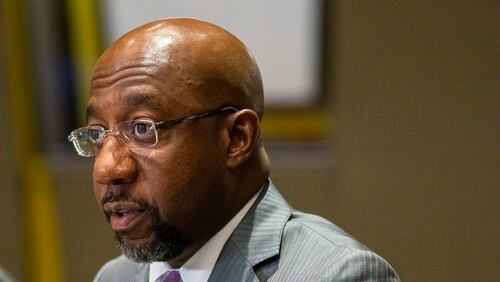Seven months into his first term in Congress, U.S. Sen. Raphael Warnock has become a top target of Republicans seeking to oust him.
Both his supporters and critics say that, so far, he is doing what he said he would do when he ran. And that has given both ammunition to make their case to voters.
Warnock, the state’s first Black U.S. senator, has supported issues such as coronavirus stimulus checks, federal voting laws and Medicaid expansion that have won him praise from supporters but also created a record that Republicans wasted no time in attacking.
Next year’s election outcome will depend largely on whether most voters agree Warnock is out of touch or if they identify with his vision.
The highest-profile issue for the freshman senator has been voting rights. He criticized Georgia’s new election law that restricts access to the ballot, saying it would disproportionately affect voters of color.
Warnock has encouraged Senate colleagues to continue working on federal legislation that could offset some of the changes at the state level.
“We are witnessing right now a massive and unabashed assault on voting rights and voter access unlike anything we have seen since the Jim Crow era,” he said during his inaugural floor speech in March. At the same time, the GOP-led Georgia General Assembly was debating changes that ultimately became law.
Republicans, who said their goal was to make voting more secure, accused Warnock and other Democrats of lying about the effects of Georgia’s new law and unfairly comparing it to Jim Crow.
Republican groups later ran ads during the Major League Baseball All-Star game that criticized Warnock for backing the league’s decision to relocate the game to Denver in protest of Georgia’s law. Agriculture Commissioner Gary Black, who is running against Warnock, ran his own ad that blamed “liberals like Raphael Warnock and Stacey Abrams” for the league’s decision.
Warnock spoke out against MLB’s decision to move the game, saying it was his “hope that businesses, athletes and entertainers can protest this law not by leaving Georgia, but by coming here and fighting voter suppression head on.’’
Warnock and other Democrats want Congress to pass a law that would create national standards for early voting, voter registration, redistricting, campaign finance and more. Republicans have described this proposal as a Democratic power grab that infringes on states’ rights.
Savannah Viar, a spokeswoman for the Republican National Committee, said the legislation is “wildly unpopular with Americans and Georgians.”
It’s just one example of positions Warnock has taken that highlight why he needs to be voted out, Viar said.
“His voting record has already been one of the most, if not the most, liberal voting record of any senator right now,” she said. “And it definitely does not match with traditional Georgia values.”
Brian Robinson, a GOP strategist who is currently working for the campaign of Latham Saddler, who is vying for Warnock’s seat, said Warnock’s public speaking abilities coupled with disciplined campaigning helped him take advantage of the disarray on the GOP side the last go-round.
“He was able in 2020 to run without a record, to run without having a primary opponent rip him apart and never had a negative ad run against him until the runoff because of the special circumstances of the special election,” Robinson said.
Now that Warnock has taken votes on controversial issues, the question is who can best articulate in forums and debates why Georgia would be better off with a more conservative senator, Robinson said.
“He is going to have to talk about his record, not that he likes puppies and puffer vests,” Robinson said. “And he is going to have to answer for it.”
Terrence Clark, who served as Warnock’s communications director during the 2020 election and runoffs, said Warnock will be happy to talk about his record. Clark said the election showed that leaning into more progressive issues was not a fatal decision for Warnock, fellow Democratic U.S. Sen. Jon Ossoff or President Joe Biden.
Clark said the campaign also prioritized defining Warnock as a populist and champion for all. He believes that will continue to be a winning strategy, especially as Georgia’s demographics grow younger, more diverse and more Democratic.
“We’re in a time right now where candidates like him fit the state much more,” he said, “at least going into the future.”
Emory University political science professor Andra Gillespie said Warnock’s ability to repeat victory in 2022 will hinge less on whether he can persuade voters on the right or in the center. In today’s climate, close races are determined on turnout, which means Warnock needs to ensure his actions in office and on the campaign trail excite his base.
“Trying to appeal to a shrinking middle doesn’t make sense because the numbers aren’t really there anymore,” she said.
It helps that Warnock is building his Senate record upon his activism on health care and voting rights that began before he considered running for office, Gillespie said. And now he will have the added power of incumbency, which keeps him in the public eye and has already helped him build a substantial campaign war chest.
“His challenge this year is to make people comfortable seeing him as a senator and using his office to try to be out and responsive,” she said.
Warnock’s record also includes advocating for additional funding for Georgia’s ports and to create clean-energy jobs. He persuaded senators to fund incentives to increase U.S. production of semiconductors that could fix some of the supply-chain issues at the Kia car assembly plant in West Point.
Add that to his work on voting rights and health care, and his campaign thinks Warnock’s record forms the basis of a winning message.
“Every day Senator Reverend Warnock is focused on working for the people of Georgia no matter who they are or where they live,” campaign manager Quentin Fulks said.
Warnock’s vote in favor of a $1.9 trillion coronavirus relief bill is another example of where he was praised on the left and criticized on the right.
The measure passed Congress without the support of a single Republican and included a fresh round of direct stimulus checks for families. But Republicans, including Gov. Brian Kemp, said the package jilted Georgia from receiving its fair share.
Republican groups also accused Democrats of unnecessary spending and said the bill would balloon the national debt.
At Warnock’s urging, the package included a loan forgiveness program for farmers of color. He said it was in response to complaints he heard from Black farmers in Georgia about unequal access to U.S. Department of Agriculture programs.
White farmers said the debt relief was unfair because it was based on race and didn’t require recipients to show any proof of discrimination. Shortly after the USDA announced plans to accept applications, multiple lawsuits were filed. The program is now on hold after courts said it could be unconstitutional.
Most recently, Warnock has begun talking more about a health care proposal he and other lawmakers introduced that would create a coverage program in 12 conservative states, including Georgia, that have decided against expanding Medicaid. Georgia Republicans have long resisted significantly increasing Medicaid rolls, saying the long-term costs are too high.
The March coronavirus relief bill included money for states such as Georgia to expand Medicaid, which would have reduced the number of uninsured people. The state’s GOP leaders still didn’t bite.
That is when Warnock and others introduced their plan. It is likely to be included in a new “soft” infrastructure bill that Democrats are drafting and could pass Congress without GOP support.
In a speech Thursday on the Senate floor, Warnock shared the story of Tucker business owner Amy Bielawski, who does not have reliable health coverage.
“Until we get this done, because I believe that health care is a human right, I’m going to keep lifting up Amy’s story and the stories of other Georgians who would benefit from this lifesaving legislation,” he said.
Whether messages like this resonate with voters such as Christopher Macken, who supported Warnock in the runoffs, may be the key to the 2022 election.
Prior to the age of Donald Trump, Macken mostly voted for Republicans. The Atlanta resident said he doesn’t believe he will return to the GOP any time soon because he dislikes the current trajectory of the party. But Macken also said that Warnock is doing the right things: connecting with voters, keeping it real and providing a fresh voice in Washington.
“I really like to have our politicians be more hyperfocused on the needs of Georgians,” he said. “In my opinion, I feel like Raphael Warnock is doing a good job of that, so he would have my vote again. It just seems to me like he addresses normal issues that normal people think about.”
WARNOCK’S VOTING RECORD
He supported:
Convicting President Donald Trump of impeachment charges relating to the Jan. 6 Capitol riot (Needed 2/3 majority to convict, failed 57-43)
Proceeding to debate on creating a bipartisan Jan. 6 commission (Bill needed 60 votes, died 54-35)
Biden’s $1.9 trillion coronavirus relief package (Passed 50-49)
Proceeding to debate on a sweeping federal elections bill (Bill needed 60 votes, died 50-50)
Bill to boost tech research and development and address Chinese competition (Passed 68-32)








